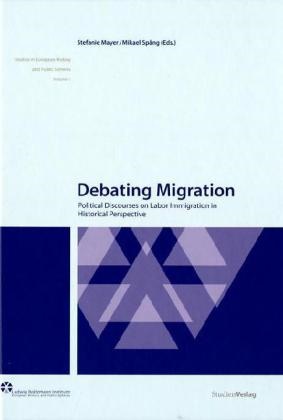Read more
Stefanie Mayer and Mikael Spång take a close look at debates about (labor) immigration in Austria and Sweden by comparing discussions during the 1960s and 1970s with contemporary political discourse. The authors combine their research on institutional developments with elements of critical discourse analysis in a comparative perspective.
The volume also includes comments from experts on migration issues from former emigration and/or EU-accession countries, such as Finland, Turkey, former Yugoslavia and the Czech Republic, thereby casting light on how migration issues have been discussed in different contexts.
The Editors
Stefanie Mayer, Mag.a, completed her Master at the University of Vienna in 2004 and is currently working on her PhD-project in Political Science at the Sociology Department of the Institute for Advanced Studies in Vienna.
Mikael Spång is Associate Professor of Political Science at the Department of Global Political Studies, Malmö University. He has published several books on migration, human rights and democracy.
CONTENTS
Mikael Spång and Stefanie Mayer: Introduction
Institutional Structures and Political Systems
Migration Patterns during the Post World War II Era
Method and Material
Structure of the Publication
Stefanie Mayer: Migration & Labor Markets. Political Discourse in Austria
Protecting the National Labor Market from Habsburg to the Second Republic
Development of the Policy Field Immigration (1960s/1970s) Integration before Immigration
Austria going EU
Conclusions
Mikael Spång: Debating Labor Immigration and Immigration Policy in Sweden, 1960 2008
Introduction
Immigration Policy during the early and mid 20th Century
Regulating Labor Immigration in the 1960s
Topoi in the 1960s Debate on Labor Immigration
Refugee Immigration and Family Reunification in the 1970s and 1990s
The 1989 Aliens Act and the 1989 Decision on Refugees
Changes to Refugee Immigration and Family Reunification Policy in the 1990s
The Europeanization of Immigration Policy
Labor Immigration from outside the EU
Topoi to the Debate about Labor Immigration from outside the EU
The 2004 Debate about Transition Rules
Topoi to the 2004 Debate about Transition Rules
Conclusions
Selma Muhic Dizdarevic: A Question of Equality. Some Aspects of the Temporary Restrictions in Access to the EU-15 Labor Market in the Czech Republic
Introduction
Restrictions vs. Needs
Restrictions towards Third Country Nationals
Conclusions
Dunja Larise: The Socialist Federative Republic of Yugoslavia and the
Economic Emigration of the Sixties, Seventies and Eighties
Ayhan Kaya: Transnationalizing Integration in the Age of Securitization:
A Perspective through Euro-Turks
Changing Immigration Laws: Attracting Qualified Labor
Transnationalizing Integration
Concluding Remarks
Saara Pellander: Sending and Receiving, Welcoming and Excluding:
Developments and Debates in Finland s Migration Policy
Migration Patterns in Finland
Towards a Finnish Migration Policy
Conclusion: Finland following Sweden s Footsteps?
Mikael Spång and Stefanie Mayer: Conclusions
Changing Institutional Arrangements
Liberalization and Regulation
Debates and Contention about Integration
Topics in Migration Debates
Institutions and Discourse intertwined
Sources and Literature
Authors

